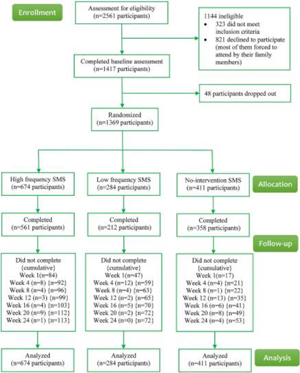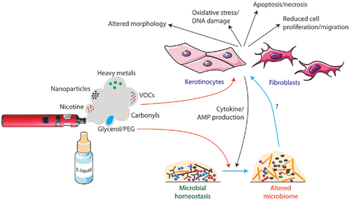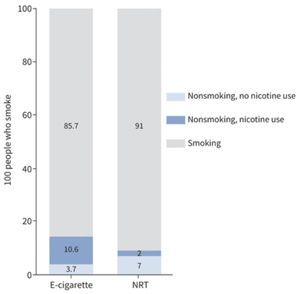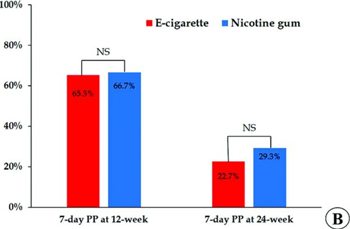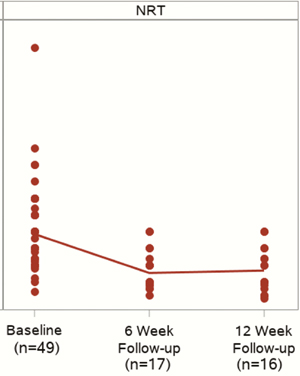A Randomized Clinical Trial Examining the Effects of Instructions for Electronic Cigarette Use on Smoking-Related Behaviors and Biomarkers of Exposure Get access Arrow
Electronic cigarettes (e-cigarettes) have the potential to significantly reduce exposure to harmful constituents associated with cigarette smoking when smokers completely substitute cigarettes with e-cigarettes. This study examined patterns of e-cigarette and cigarette use, and extent of toxicant exposure, if smokers were instructed and incentivized to completely switch to e-cigarettes compared to instructions to use the product ad libitum.
A systematic review of randomized controlled trials and network meta-analysis of e-cigarettes for smoking cessation
E-cigarettes, or nicotine vaping products, are potential smoking cessation aids that provide both nicotine and behavioural substitution for combustible cigarette smoking. This review aims to compare the effectiveness of nicotine e-cigarettes for smoking cessation with licensed nicotine replacement therapies (NRT) and nicotine-free based control conditions by using network meta-analysis (NMA).
Electronic Cigarettes and Oral Health
Novel nicotine products, particularly electronic cigarettes (e-cigarettes), have become increasingly popular over the past decade. E-cigarettes are sometimes regarded as a less harmful alternative to tobacco smoking, and there is some evidence of their potential role as a smoking cessation aid. However, there are concerns about their health consequences, particularly in users who are not tobacco smokers, and also when used long term. Given the mode of delivery of these products, there is potential for oral health consequences.
E-cigarettes and nicotine abstinence: a meta-analysis of randomised controlled trials
Objectives: To determine the effects of electronic cigarettes (e-cigarettes) as a therapeutic intervention compared to nicotine replacement therapy (NRT) on nicotine abstinence.
Methods: Two authors independently searched the PubMed, Embase, PsycInfo and Cochrane Central Register of Controlled Trials databases for articles published up to and including 10 July 2021. We included randomised controlled trials (RCTs) in which nicotine e-cigarettes were compared to NRT among current cigarette users.
Effect of Electronic Cigarettes on Smoking Reduction and Cessation in Korean Male Smokers: A Randomized Controlled Study
Introduction: New approaches to electronic cigarettes (e-cigarettes) as a form of nicotine replacement therapy (NRT) may reduce the rates of tobacco-related disease and mortality. Therefore, we investigated the effect of e-cigarettes on smoking cessation compared with nicotine gum.
Randomized Trials of e-Cigarettes for Smoking Cessation
Few topics in public health and medicine are as contentious as electronic cigarettes (e-cigarettes), a diverse and rapidly evolving array of products that appeared on the consumer market a decade ago. e-Cigarettes are battery-powered devices that heat a solution, typically containing nicotine and other chemicals including flavorings, to produce an aerosol that users inhale or "vape." e-Cigarettes do not burn tobacco to generate smoke, and it is the many chemicals in tobacco smoke-not the nicotine-that are responsible for the global burden of tobacco-related disease that accounts for an estimated 6 million deaths worldwide and nearly half a million deaths in the US each year
Randomized Trial of E-Cigarettes vs Nicotine Replacement Therapy - E-Cigarettes vs Nicotine Replacement Therapy
This trial demonstrated that e-cigarettes are more efficacious compared with nicotine-replacement products for abstinence at 1 year among participants motivated to quit smoking, although the overall success rate remains very low. The goal of the trial was to assess the efficacy of refillable e-cigarettes as compared with nicotine replacement among adults seeking help to quit smoking.
QuitNic: A Pilot Randomized Controlled Trial Comparing Nicotine Vaping Products With Nicotine Replacement Therapy for Smoking Cessation Following Residential Detoxification
The QuitNic pilot trial aimed to test the feasibility of providing a nicotine vaping product (NVP) compared with combination nicotine replacement therapy (NRT) to smokers upon discharge from a smoke-free residential substance use disorder (SUD) treatment service.
Research
Reports
Featured Posts
Effectiveness of a text-messaging-based smoking cessation intervention ("Happy Quit") for smoking cessation in China: A randomized controlled trial
